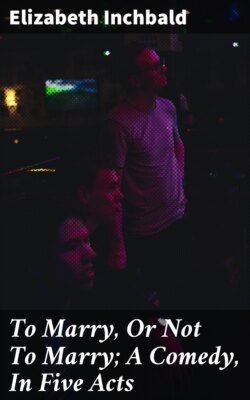Читать книгу To Marry, Or Not To Marry; A Comedy, In Five Acts - Elizabeth Inchbald - Страница 3
REMARKS.
ОглавлениеIt appears as if the writer of this play had said, previous to the commencement of the task, “I will shun the faults imputed by the critics to modern dramatists; I will avoid farcical incidents, broad jests, the introduction of broken English, whether Hibernian or provincial; songs, processions, and whatever may be considered by my judges as a repetition of those faults of which they have so frequently complained.”
Vain is the forecast of both man and woman!—Supposing all those evils escaped which the authoress dreaded, what is the event of her cautious plan?—Has she produced a good comedy?—No. She has passed from one extreme to another; and, attempting to soar above others, has fallen even beneath herself.
In the dearth of wit, an audience will gladly accept of humour: but the author who shall dare to exclude from his comedy the last, without being able to furnish the first, assuredly must incur the rigorous, though just sentence, of dulness.
There is a degree of interest in the fable of “To Marry, or not to Marry,” which protected it on the stage, and may recommend it to the reader. The characters of Sir Oswin, Mrs. Sarah Mortland, Hester, and her father, are all justly drawn, but not with sufficient force for high dramatic effect. Their serious tendency wants relief from characters of more risible import, or from more comic materials contained in themselves. They are elegant and natural, but not powerful in any of their diversified attempts upon the heart.
Simplicity, the first design in the composition of this play, is perhaps, for the accomplishment of theatrical success, the most difficult of all attainments.
The stage delights the eye far oftener than the ear. Various personages of the drama, however disunited, amuse the looker on; whilst one little compact family presents a sameness to the view, like unity of place; and wearies the sight of a British auditor fully as much.
Incidents, too, must be numerous, however unconnected, to please a London audience: they seem, of late, to expect a certain number, whether good or bad. Quality they are judges of—but quantity they must have.
Still, perhaps, there wants but the pen of genius to give to a play of simple construction, all those attractive powers—which every complex drama is sure to possess.
The following remarkable observation extracted from a critique, on “To Marry, or not to Marry,” in a popular Review, is worthy of insertion.
“It is singular that the authoress should, without any foresight, have dramatised the situation of Lord Melville and Mr. Whitbread; yet this she has done: or, at least, circumstances which directly bear on the political relation in which the latter gentleman stands with the former.”
